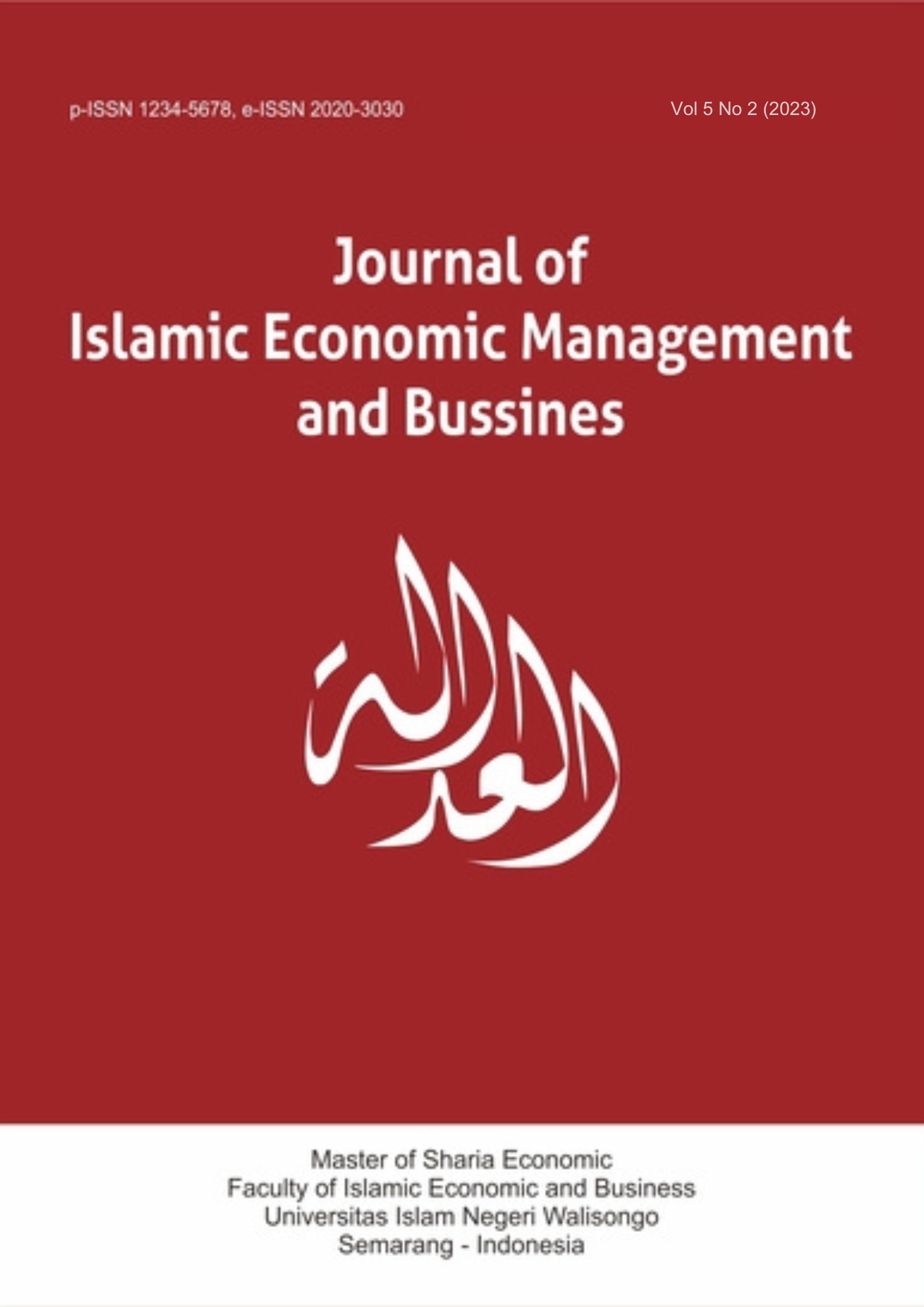Enhancing umrah pilgrim satisfaction through effective logistic services and inventory management
DOI:
https://doi.org/10.21580/jiemb.2023.5.2.15097Keywords:
logistic services, inventory management, umrah pilgrims, customer satisfaction, travel industry.Abstract
This study explores the impact of logistic services and inventory management on the satisfaction of umrah pilgrims at PT. Asyesa Hasanah Tour & Travel Sumatera Barat. The research addresses the need for effective logistics management in the umrah travel industry, highlighting its importance in providing timely and quality services to pilgrims. Utilizing a quantitative approach, data were collected from 85 respondents among a population of 536 umrah pilgrims. The study found that logistic services, characterized by reliability, timeliness, and resource availability, significantly enhance pilgrim satisfaction. Similarly, efficient inventory management, involving precise planning, control, and distribution of goods, also positively impacts satisfaction levels. The findings suggest that both logistic services and inventory management are critical in ensuring high levels of customer satisfaction. The study concludes that umrah travel companies should continuously improve their logistic and inventory management strategies to maintain competitive advantage and meet the evolving needs of their customers. This research contributes to the literature by providing detailed insights into the operational components of logistics and inventory management within the context of umrah travel, emphasizing the role of technology and employee satisfaction in enhancing service delivery.
Downloads
References
Abbas, G. (2023). Pengaruh Kualitas Pelayanan Islami, Fasilitas dan Citra Perusahaan terhadap Kepuasan Konsumen pada Jamaah Umroh PT. Tazkiyah Global Mandiri Makassar. Madinah Jurnal Studi Islam, 10(2), 283-297. https://doi.org/10.58518/madinah.v10i2.1996
Anwar, M. (2019). Dasar-Dasar Manajemen Keuangan Perusahaan. Jakarta: Kencana.
Arikunto, S. (2014). Prosedur Penelitian. Jakarta: Rika Cipta.
Bungin, B. (2013). Metodologi Penelitian Sosial & Ekonomi: Format-Format Kuantitatif dan Kualitatif Untuk Studi Sosiologi, Kebijakan Publik, Komunikais, Manajemen, dan Pemasaran. Jakarta: Kencana Prenada Media Group
Chandra, A. (2013). Analisis Kinerja Distribusi Logistik pada Pasokan Barang dari Pusat Distribusi ke Gerai Indomaret di Kota Semarang. Universitas Diponegoro.
Garside, A. K. (2017). Manajemen Logistik. Malang: Universitas Muhammadiyah Press.
Grace, E., Sinaga, O., Silalahi, M., Ambarita, M., & Simatupang, S. (2022). Harga dan Kualitas Pelayanan serta Pengaruhnya terhadap Kepuasan Pelanggan. Buletin Poltanesa, 23(1), 35-44. https://doi.org/10.51967/tanesa.v23i1.931
Herdiansyah. (2013). Wawancara, Observasi, dan Focus Groups. Jakarta: Rajawali Pers
Ibrahim (2018). Metodologi Penelitian Kuantitatif. Bandung: Alfabeta, 2018
Lutfiana, L. & Puspitosari, I. (2020). Analisis Manajemen Persediaan pada Usaha Mikro, Kecil, dan Menengah Bastomi Batik di Purworejo”, Jurnal Ekonomi Syariah, Akuntansi dan Perbankan (JESKaPe), 4(1), 55-66.
Mustafa, B. (2018). Pengantar Hukum Manajemen Logistik. Bandung: Citra Aditya Bakti
Mustafa, Z. (2009). Mengurai Variabel Hingga Instrumentasi. Yogyakarta: Graha Ilmu
Nahita, P. & Saragih, E. (2021). Pengaruh Kepuasan Kerja terhadap Komitmen Organisasional Karyawan pada Organisasi Kantor Hukum. Journal of Management and Business Review, 18(2), 393-405. https://doi.org/10.34149/jmbr.v18i2.296
Nasution. (2014). Metode Research: Penelitian Ilmiah. Jakarta Bumi Aksara, 2014
Pramudita, A. S., Hilman, T., & Nasution, S. R. (2022). Pengaruh Kualitas Pelayanan Logistik terhadap Kepuasan Pelanggan (Studi Kasus: J & T Express DP Padangsidimpuan). Pro Mark: Jurnal Bisnis dan Manajemen, 12(1), 1-9. https://ejurnal.ulbi.ac.id/index.php/promark/article/view/2165
Prihanto, H. & Damayanti, P. (2022). Faktor-faktor yang Berpengaruh Pada Keberlanjutan Usaha Biro Jasa Perjalanan Haji dan Umrah. Journal of Management and Business Review, 19(1), 29-48. https://doi.org/10.34149/jmbr.v19i1.314
Pujiastuti, E., Suratna, S., & Puspita, I. (2022). Pengaruh Manfaat Rekreasi dan Atribut Destinasi terhadap Kepuasan Wisatawan serta Dampaknya pada Niat Kunjung Kembali (Revisit Intention) di Masa Pandemi Covid 19. Business Uho Jurnal Administrasi Bisnis, 7(1), 1. https://doi.org/10.52423/bujab.v7i1.24909
Safrina, W. (2023). Pengaruh Customer Value dan Customer Experience terhadap Minat Pembelian Ulang melalui Kepuasan Pelanggan sebagai Variabel Intervening (Studi pada Jemaah PT. Penata Rihlah Jakarta). Jurnal Ilmu Administrasi Bisnis, 12(1), 140-148. https://doi.org/10.14710/jiab.2023.37217
Sugiono. (2014). Metode Penelitian Bisnis. Bandung: Alfabeta
Sugiono. (2019). Metode Penelitian dan Pengembangan (Reseach and Development). Bandung: Alfabeta
Suryani, H. (2015). Metode Riset Kuantitatif: Teori dan Aplikasi. Jakarta: Kencana.
Sutarman. (2017). Dasar-Dasar Manajemen Logistik. Bandung: PT. Revika Aditama
Utami, N. & Sitorus, O. F., (2015). Manajemen Logistik di Giant Ekstra. Jurnal Utilitias, 1(1), 92-103. https://doi.org/10.22236/utilitas.v1i1.4527
Versa, B. (2014). Pengaruh Logistics Service Quality terhadap Customer Satisfaction Cat Emco PT Stria Karya Adiyudha (PT SKAY). Jurnal Strategi Pemasaran, 2(2), 1-9. https://publication.petra.ac.id/index.php/manajemen-pemasaran/article/view/2804
Wisdiani, Z. (2018). Pengaruh Tenaga Penjualan, Emosi Pelanggan terhadap Kepuasan Pelanggan Melalui Keputusan Pembelian. Fakultas Ekonomi Universitas Negeri Semarang. https://lib.unnes.ac.id/37980/
Downloads
Published
Issue
Section
License
Authors who publish with this journal agree to the following terms:
Authors retain copyright and grant the journal right of first publication with the work simultaneously licensed under a Creative Commons Attribution-ShareAlike 4.0 International License that allows others to share the work with an acknowledgement of the work's authorship and initial publication in this journal.
Authors are able to enter into separate, additional contractual arrangements for the non-exclusive distribution of the journal's published version of the work (e.g., post it to an institutional repository or publish it in a book), with an acknowledgement of its initial publication in this journal.
Authors are permitted and encouraged to post their work online (e.g., in institutional repositories or on their website) prior to and during the submission process, as it can lead to productive exchanges, as well as earlier and greater citation of published work (See The Effect of Open Access).



